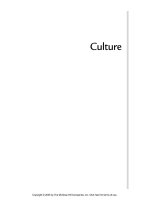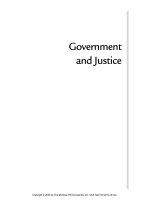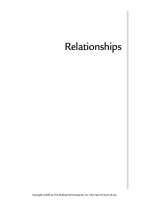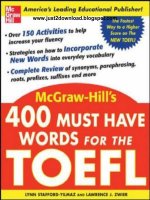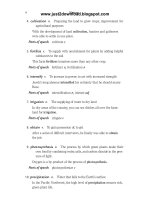Mcgraw Hill 400 Must Have Words For The Toefl - Money
Bạn đang xem bản rút gọn của tài liệu. Xem và tải ngay bản đầy đủ của tài liệu tại đây (1.86 MB, 26 trang )
Money
Copyright © 2005 by The McGraw-Hill Companies, Inc. Click here for terms of use.
This page intentionally left blank.
LESSON
Financial Systems
Target Words
1.
allocate
6.
net
2.
commodity
7.
per capita
3.
decline
8.
regulate
4.
equity
9.
subsidy
5.
inflation
10.
tangible
Definitions and Samples
1.
allocate v.
To give out different amounts for different purposes
The budget allocates $58 billion to the military and only about
$2 billion to education.
Usage tips
Things that can be allocated are things that can be
“spent”—money, time, energy, etc.
Parts of speech
allocation
n
2.
commodity n.
A thing that can be bought and sold, such as grain, oil,
or wood
Tulip bulbs were one of the most valuable commodities in
seventeenth-century Holland.
Usage tips
A thing is called a commodity only in the context of
buying or selling it.
20
Copyright © 2005 by The McGraw-Hill Companies, Inc. Click here for terms of use.
3.
decline v.
To decrease in power or amount
America’s railroads declined because the automobile dominated
American life.
Parts of speech
decline
n
4.
equity n.
The value of one’s share in an investment
Barnard’s equity in the business was one-third, or about $350,000.
Usage tips
In this meaning, equity is always singular and usually
followed by an in phrase.
5.
inflation n.
A situation in which prices for many items rise quite fast
During the rapid inflation of the 1970s, prices for food and fuel
sometimes rose 20 percent in a single month.
Parts of speech
inflate
v,
inflationary
adj
6.
net adj.
After all costs have been subtracted from an amount
My gross salary is around $35,000, but my net pay is closer to
$29,000.
Parts of speech
net
v,
net
n
7.
per capita adv.
For each person
Research shows we’re likely to sell 15 light bulbs per capita per
year in medium-sized cities.
Parts of speech
per capita
adj
8.
regulate v.
Control according to a set of rules
Trading on the New York Stock Exchange is regulated by officials of
the exchange and by federal law.
Parts of speech
regulation
n,
regulatory
adj
9.
subsidy n.
Money given by a government or other organization to sup-
port an activity
Federal subsidies to grain farmers have helped them stay in business
despite three years of bad weather.
Parts of speech
subsidize
v
98
Money
12309_Stafford_05_z.qxp 3/8/05 12:01 PM Page 98
10.
tangible adj.
Obviously real because it can be seen, touched, or oth-
erwise observed
One tangible benefit of putting electrical cables underground is a
clearer view of the sky.
TOEFL Prep I
Cross out the one word or phrase that doesn’t fit
into each of the lists.
1.
things that can be allocated
money time temperature attention
2.
kinds of commodities
oil sadness corn meat
3.
tangible things
fairness a road trees money
4.
things you can have equity in
a company a house a child a racehorse
TOEFL Prep II
Circle the word that best completes each sentence.
1.
Buy a car now, before (equity / inflation) drives the price up.
2.
Most investors make a mistake. During a stock-market (decline /
subsidy) they get frightened and sell.
3.
The government is giving a (regulation / subsidy) to tobacco farm-
ers so they can compete with foreign producers.
4.
Cortecal Inc. estimates that it spends $80.00 (per capita / net) on
its annual picnic and on its New Year party for the company’s 1,300
employees.
5.
I think that artificial “holidays”like Valentine’s Day or Secretary’s Day
are just an attempt to turn private feelings into a(n) (commodity /
equity).
TOEFL Success
Read the passage to review the vocabulary you
have learned. Answer the questions that follow.
The great unsettled question of economics is: “How much should the
government regulate business?” Conservatives generally argue for a
Financial Systems
99
decline in government involvement, but they favor certain subsidies to
farmers, steelmakers, or airplane manufacturers. Some conservatives also
see no conflict between their small-government views and their eagerness
for the government to allocate more money for roads into national forests.
The net result of these incursions into national forests is a tangible
infrastructure that helps some companies but not the public. Publicly
owned trees, land, and oil become commodities from which a
few private companies (many owned by small-government
conservatives) profit. No per capita benefit goes to the
American people, aside perhaps from the brief anti-inflation
effect that comes with new oil exploration.
1.
What is the main idea of this reading?
a.
Conservatives have tried to keep others from expanding govern-
ment regulations.
b.
Even though conservatives say they want to limit government in-
volvement in business, they actually do often favor it.
c.
There are several views about the proper role for government in
business.
d.
Small-government conservatives want the government to allocate a
certain amount of federal money per capita to help all Americans.
2.
Which of the following does the author claim?
a.
Industries will become subsidies.
b.
Oil exploration causes inflation.
c.
Some elements of nature will become commodities.
d.
Infrastructure will be made of trees, oil, and land.
Lesson 20
Financial Systems
TOEFL Prep I
1.
temperature
2.
sadness
3.
fairness
4.
a child
TOEFL Prep II
1.
inflation
2.
decline
3.
subsidy
4.
per capita
5.
commodity
TOEFL Success
1.
b
2.
c
100
Money
Bonus Structure—
Aside perhaps
from means
“maybe except for.”
LESSON
Wealth and Social Class
Target Words
1.
accumulate
6.
nobility
2.
affluence
7.
prestige
3.
elite
8.
privileged
4.
impoverish
9.
prosper
5.
luxury
10.
working class
Definitions and Samples
1.
accumulate v.
To build up a large amount of something
Over several generations, the Hardington family accumulated vast
wealth by buying and selling land.
Parts of speech
accumulation
n
2.
affluence n.
Wealth and the style of life that goes with it
Mohadzir grew up amid affluence, which poorly prepared him for
his grad student days in crowded apartments with no servants.
Parts of speech
affluent
adj
3.
elite adj.
Belonging to a special, honored group
Messner is an elite climber who recently ascended an 8,000-meter
mountain without extra oxygen.
Parts of speech
elite
n,
elitist
adj
21
Copyright © 2005 by The McGraw-Hill Companies, Inc. Click here for terms of use.
4.
impoverish v.
To make a person or group poor
The collapse of the steel industry impoverished several counties in
eastern Ohio.
Parts of speech
impoverishment
n
5.
luxury n.
Extreme comfort, beyond what anyone needs
Automakers try to give their cars an image of luxury by including
extras like heated seats and satellite tracking systems.
Parts of speech
luxuriate
v,
luxurious
adj
6.
nobility n.
A group of socially prominent people with special titles
given by a king or queen, such as “duke”or “countess”
In the Middle Ages, the nobility supposedly followed a code that
required them to take care of poorer people who lived near their
estates.
Usage tips
Nobility is used as a name for a group of distinguished
people; it can also mean “a highly dignified form of behavior.”
Parts of speech
noble
n,
noble
adj
7.
prestige n.
Honor and respect for being better than the average
The Grassleys enjoyed the prestige of living in the historic town, but
they did not feel at home there.
Parts of speech
prestigious
adj
8.
privileged adj.
Able to enjoy special advantages because of one’s
position (usually because of being born into a wealthy or powerful
family)
Despite his privileged position in one of America’s most powerful
families, the politician tried to portray himself as an ordinary
person.
Parts of speech
privilege
n
9.
prosper v.
To do very well in one’s business or personal life
Vargas prospered after finally patenting his new inventions.
102
Money
Usage tips
A person can prosper; so can a group, a company, or an
area.
Parts of speech
prosperity
n,
prosperous
adj
10.
working class n.
People with low-paying (often unskilled) jobs who
are not poor but who are not securely in the middle class
The Farrelly family, like other members of the working class, were
proud of their jobs and did not want any handouts from charity or
the government.
TOEFL Prep I
Find the word or phrase that is closest in meaning
to each word in the left-hand column. Write the letter in the blank.
Note: Many words in this chapter are similar in meaning. Pay care-
ful attention to small differences in meaning.
1. impoverish (a) enjoying special advantages
2. elite (b) to succeed
3. prosper (c) to make extremely poor
4. accumulate (d) belonging to a small group
with excellent achievements
5. privileged (e) build up wealth
TOEFL Prep II
Complete each sentence by filling in the blank
with the best word or phrase from the list. Change the form of the
word if necessary. Use each word only once.
affluence luxury nobility prestige working class
1.
The __________ in the hotel was obvious from such features as solid-
gold faucets and stairs made of Italian marble.
2.
In a show of his extreme __________, Jim Lavich flew 1,500 people
to the Bahamas for his wife’s birthday party and ordered 300 casks
of wine for them to drink.
3.
The oldest and most respected furniture maker in western Michigan,
VanEden Inc., earned its __________ by using good materials and lis-
tening to its customers.
Wealth and Social Class
103
4.
France’s __________ was dismantled after the royal family was killed
and lesser aristocrats were jailed during the revolution.
5.
In the United States, many __________ families do not have health in-
surance because their employers don’t offer it.
TOEFL Success
Read the passage to review the vocabulary you
have learned. Answer the questions that follow.
The United States is not the land of equal opportunity.There are no titles
of nobility as in Europe, but astounding affluence is passed on in
privileged families, and this makes all the difference. Studies
in the 1970s found that a child of the elite and a child of the
working class may start out with similar intelligence and
drive, but the rich child is about 30 times more likely to
prosper. The rich child goes to high-prestige schools, where
his or her education may be only slightly above average, but
where the child accumulates friendships with future leaders.
The privileged child becomes comfortable with luxury and is
at ease in situations where powerful people meet.The working-class child
from a less-prestigious college is not likely to wind up impoverished, but
neither is he or she likely to attend many parties of Yale or Vassar alumni.
1.
Which sentence best expresses the essential information of this
passage?
a.
The American economy is unfair and must be changed.
b.
Rich people have natural advantages in education and social con-
tacts that help them succeed.
c.
Children accept one another as friends; only later in life do differ-
ences of wealth drive them apart.
d.
The only way to make money in America is to work and accumu-
late it yourself.
2.
Why does the author of this reading mention Yale and Vassar?
a.
They are elite schools attended by many future leaders.
b.
They are where government officials have secret meetings.
104
Money
Bonus Structure—
The reference to
studies in the
1970s indicates
some objective
evidence for the
author’s point.


